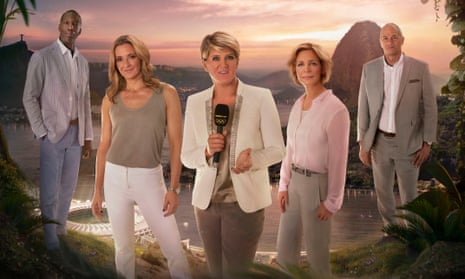The BBC was able to strike a deal to keep showing the Olympics partly because US pay-TV giant Discovery feared a backlash if it refused to share its rights to the Games with the corporation.
Discovery, the owner of Eurosport, struck a shock £920m deal to take control of the rights to the Olympics from the BBC in the UK as well as across Europe from 2022.
Discovery later struck a sub-licensing deal with the BBC as its free-to-air broadcasting partner in the UK; in turn the corporation allowed Eurosport to start broadcasting the Winter and Summer Olympics from next year.
“Yes there was economics involved and yes you can argue about the rights here and there [being aired free by Discovery in some European markets] but I don’t think anyone at Discovery wanted to be the people that took the Olympics off the BBC,” said Peter Hutton, chief executive of Eurosport, at a Broadcasting Press Guild event.
“We spend a lot of time looking after our brand. We want to be seen as someone who genuinely helps the sports industry and is positive to sports fans. You don’t want to be associated with [negative] stories that make the sports viewing experience worse.”
As part of the regulations of the International Olympic Committee, which auctions the rights to the Olympics, Discovery had to strike a deal to make hundreds of hours of Olympic coverage available on free-to-air TV.
The company could have aired all of the Olympics on its own free-to-air channels, in Norway and Sweden it is doing just that, or in the UK could have looked at ITV, Channel 4 or Channel 5.
“If you look at what we have done in Norway and Sweden for example the plans are we show everything on our own channels, we have big free-to-air channels [there], that takes us down one direction,” said Hutton. “You look at the UK and what the BBC have done with London in particular, that was an amazing achievement and success story for the Olympics, the BBC.”
Hutton said the fact that keeping the Olympics with the BBC, which does not run ads, instead of a commercial free-to-air partner was not made because it will mean Eurosport will be the exclusive place that companies can run ads around Olympic events for the first time in the UK.
“Genuinely it was not a big factor,” he said. “I think let’s see where we go with our Olympic ad sales story. if you put it on the BBC it is going to get a huge audience. Also [that means] putting it in a place people have always seen as the natural home of the Olympics.”
Hutton said that under the IOC deal Eurosport is allowed to start using the Olympic rings on its channel from 1 January next year.
“We will start putting Olympic-related content on the channel from that day,” he said. “We are allowed to call ourselves the home of the Olympics.”
In February, Eurosport struck an exclusive deal with Jonathan Edwards to be its lead presenter fronting flagship sports programming including the Olympics.
Asked if Eurosport intended to raid the BBC’s presenting lineup for further big name talent to boost its Olympic coverage, Hutton said:
“No. I think with something like the Olympics it is really important to talk to the BBC and say ‘look, you do this, we’ll do that’ and create complementary coverage,” he said. “There is no point going in there and being aggressive, that’s a waste of effort.”
Hutton also said that Eurosport harbours plans to dramatically increase its Wimbledon coverage.
Earlier this year, Eurosport became the first commercial pay-TV broadcaster to be allowed to broadcast live coverage of Wimbledon in the UK after finalising deals with the All England Lawn Tennis Club.
The deal to simultaneously air the final live as well as daily evening highlights also required agreement from the BBC, which has aired Wimbledon for eight decades, and broadcasting regulator Ofcom.
“The BBC have allowed us in, that is clear, they didn’t need to do this deal but they allowed us in,” said Hutton. “We’d love to do more with them [the BBC and rights holder AETC].”
Eurosport has been building its relationship with AETC, which holds the rights to the Wimbledon tournament] across Europe in recent years.
The broadcaster started several years ago with the rights to air Wimbledon in just one market, Belgium. This year that expanded to 12 markets across Europe.
Next year Hutton revealed that Eurosport will broadcast Wimbledon to in excess of 25 markets, and he is aiming to expand the relationship further.
“Maybe there are things we can do in the build up like the [Wimbledon] qualifiers, the juniors [Wimbledon tournament] or disabled players. I hope we can talk to Wimbledon and ask how we can deepen that relationship in the UK and other markets if there is space. I think they saw we offered something that didn’t hurt the BBC and that is important.”

Comments (…)
Sign in or create your Guardian account to join the discussion